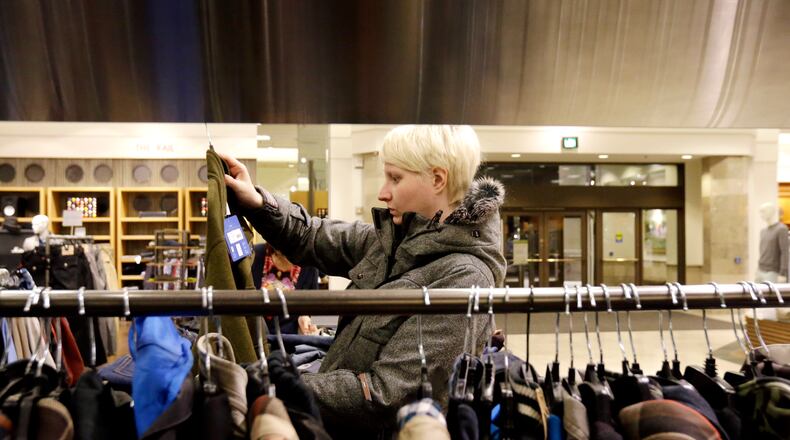Consumer survey by the numbers
• 58.2 percent said their spending, saving or budgeting plans have been either somewhat or greatly impacted by restoration of the full payroll tax.
• 45.7 percent say they will spend less overall.
• 35.6 percent will watch for sales more often.
• 33.5 percent will reduce how much they dine out.
• 24.5 percent will spend less on “little luxuries,” such as trips to coffee shops and manicures.
• Survey polled 5,185 consumers nationwide from Feb. 5-13.
Source: National Retail Federation 2013 Tax Returns survey
Consumers’ newfound reluctance to spend their smaller paychecks is sending shock waves throughout the economy, from area restaurants and shopping malls to Ohio’s largest employer.
A National Retail Federation survey released Thursday showed that nearly three out of four consumers — 73.3 percent — said they would cut back on spending to cope with a change in federal tax law that decreased the take-home pay of many working Americans by 2 percent as of Jan. 1. The cost-saving moves include dining out less, buying fewer clothes and delaying large purchases.
That reluctance sends a chill through the nation’s retail sector, which accounts for about two-thirds of U.S. economic activity. Wal-Mart — Ohio’s largest employer, with more than 50,000 workers in the state — on Thursday offered a weak business outlook because the payroll tax increase, higher gas prices and late tax refunds have started to take a toll on the company’s low-income shoppers.
“We cannot grow the nation’s economy until consumers consume,” said NRF President and CEO Matthew Shay. “A smaller paycheck due to the fiscal cliff deal early last month, higher gas prices, low consumer confidence and ongoing uncertainty about our nation’s fiscal health is negatively impacting consumers and businesses across the country.”
Amy Haverstick, owner of Jay’s Restaurant in Dayton’s Oregon District, said she saw a “huge decrease” in sales in January compared to the previous year — a drop she blames partly on the weather, which was more severe this year than the uncharacteristically warm January in 2012, and partly on the deeply unsettled economic climate in the region. That uncertainty was reinforced Wednesday with the Pentagon’s announcement that up to 13,000 Wright-Patterson Air Force Base civilian workers could be notified by mid-March of job furloughs of up to 22 days.
“That will have a huge impact,” Haverstick said of the defense-related furloughs. And consumers’ overall reluctance to spend will also hurt sales through 2013, “because people will have less disposable income,” the restaurant owner said.
Dave Duebber, general manager of the Dayton Mall, said many of his tenants are feeling the pinch. Shoppers are still coming to the mall, and they’re still buying, Duebber said, but they’re not spending as much, and they’re not buying big-ticket items.
The survey results reinforce what retailers have been seeing for several years, Duebber said. “We’ve just been kind of flat since 2008,” he said.
Retailers have responded to the challenge in several ways, from adopting new and more aggressive pricing structures to embracing “door-buster”-style sales. “They’re searching for ways to give consumers the biggest bang for their buck,” the mall manager said.
And some retailers that historically has not depended on advertising are stepping up their promotional efforts, Duebber said.
Wal-Mart also has embraced more aggressive tactics to win over shoppers with low prices across the store and other incentives such as layaway, and the effort has paid off: the world’s largest retailer reported an 8.6 percent increase in profit for the fourth quarter which includes the crucial holiday season.
But higher gasoline prices, late tax refunds and the payroll tax increase have the Arkansas-based retailer wary about the coming year. Wal-Mart’s latest results, which cover the three months that ended Jan. 31, show that gas prices and the payroll tax increase are shrinking the little disposable income many of the chain’s customers have, according to the Associated Press.
Investors were bracing for a subdued report after a Bloomberg report published last week leaked an email from a top executive characterizing the first two weeks of February as “a total disaster.” Wal-Mart acknowledged in Thursday’s report that February started “slower than planned” but noted that it was largely due to the delay in tax refund checks.
Wal-Mart is considered an economic bellwether because the retailer accounts for nearly 10 percent of nonautomotive retail spending in the U.S. Low- and lower-middle-income people have continued to struggle even as the housing and stock markets improve.
• The Associated Press contributed to this report.
About the Author

